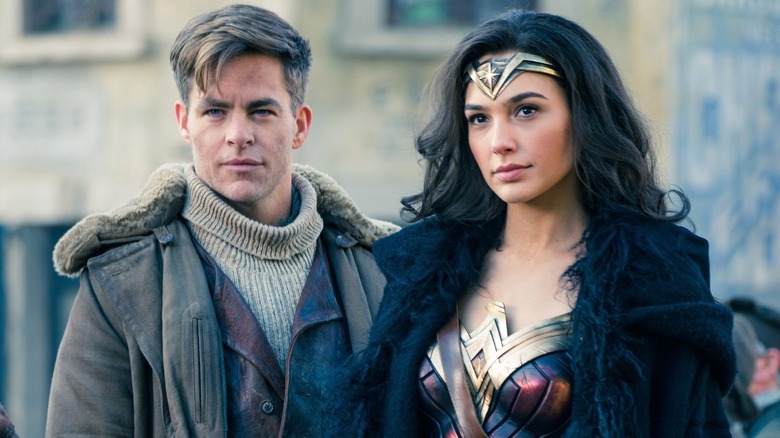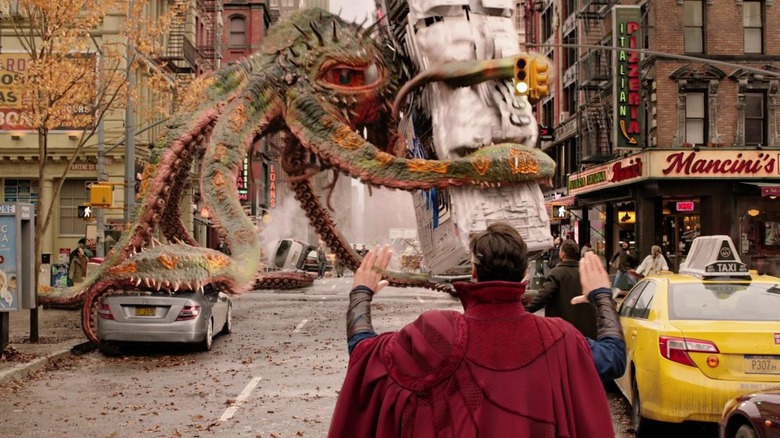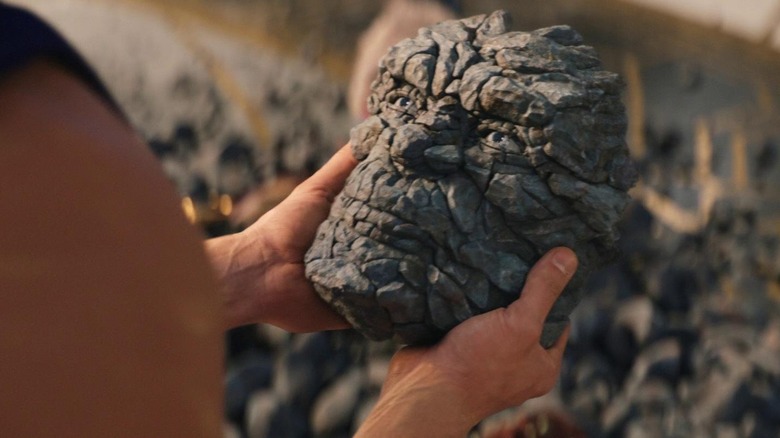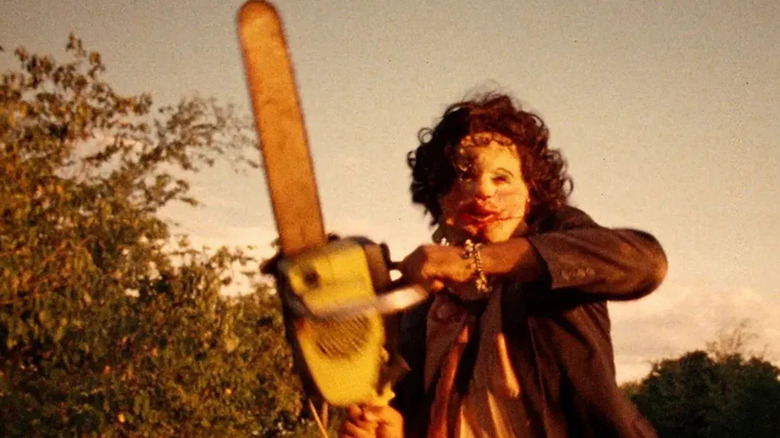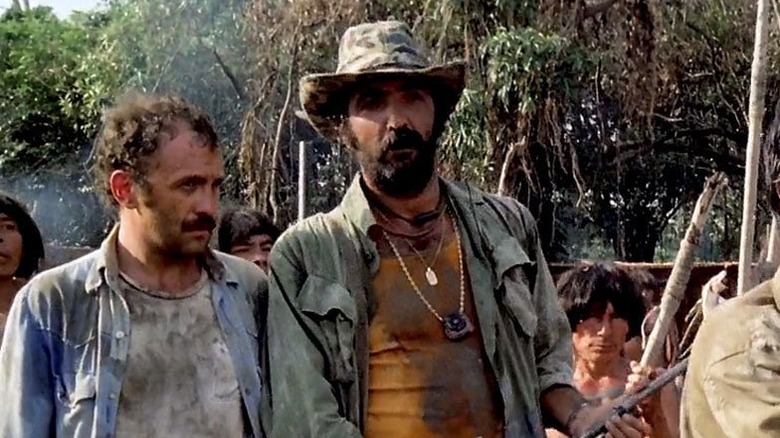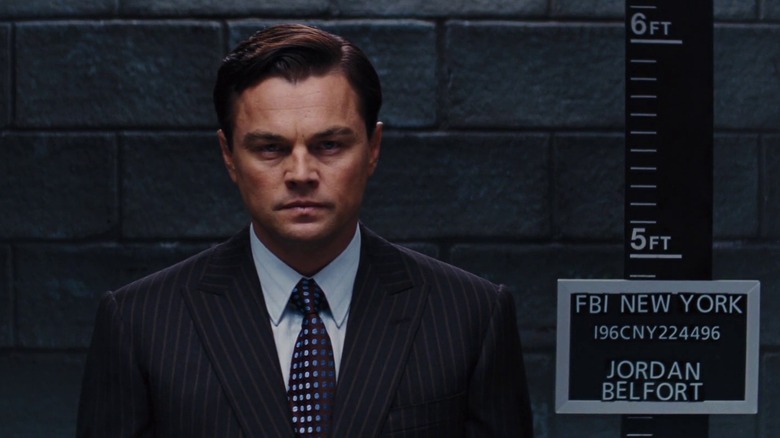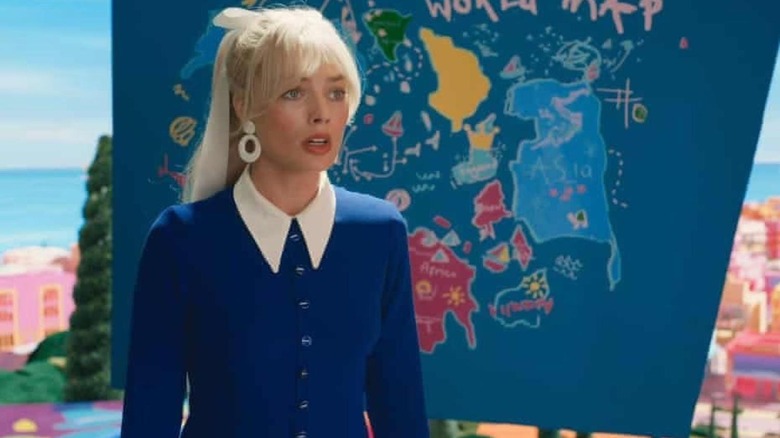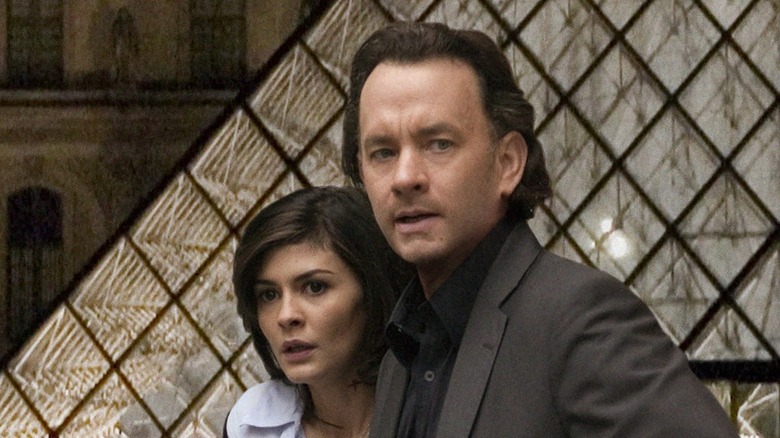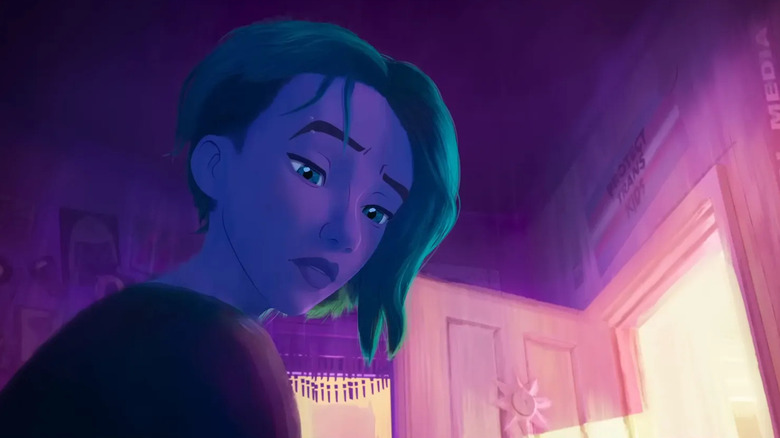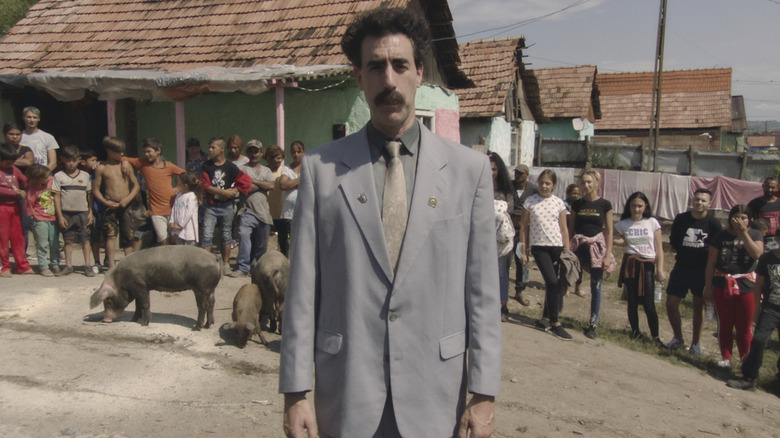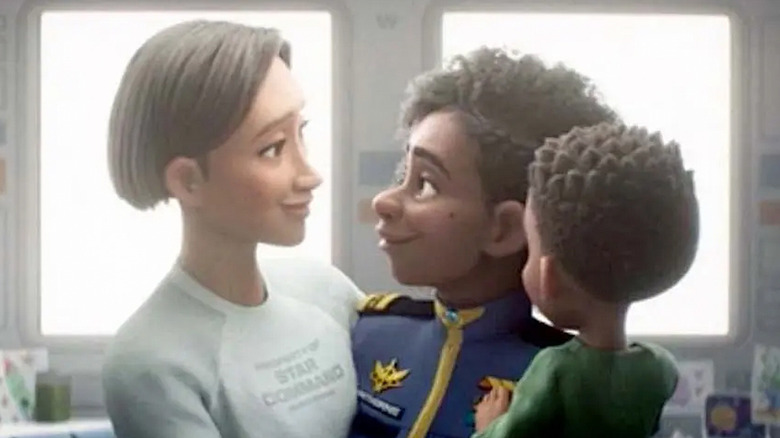Movies That Were Banned In Multiple Countries
Cultural conflicts, religious mores, political grudges — these are just some of the reasons why a film might get banned in countries around the world, preventing their residents from ever seeing it. Banning a film can be detrimental to its box office success – the Marvel Cinematic Universe lost millions of dollars in ticket sales when China blocked the majority of its releases from 2019 to 2023 – but in certain cases, a ban can also generate the sort of negative attention that lures in audiences. Case in point: the gruesome 1981 Italian thriller "Cannibal Ferox," which, when released in the United States as "Make Them Die Slowly," proudly trumpeted its record-setting (and allegedly dubious) ban in 31 countries in its advertising.
In many instances, films may have the bad (or good) fortune to be banned in more than one country, and it may be surprising to note that many of these restricted titles are hugely successful and even award-winning productions. But all fell afoul of international censors for one or more significant reasons. Following is a list of those movies that were slapped with bans from multiple countries across the globe.
Wonder Woman
Patty Jenkins' 2017 film "Wonder Woman" was a runaway hit for the former DC Films (now DC Studios), grossing more than $800 million in worldwide ticket sales. However, a significant portion of the world not only didn't see Gal Gadot's first solo feature in the title role, but also banned it from release in their respective countries. The Middle Eastern nation of Lebanon was the first to ban "Wonder Woman" from theaters, and was soon followed by Algiers, which pulled it from its prestigious "Nuits du Cinema" festival, as well as Tunisia and Kuwait. Jordan also briefly banned the film, but later recanted.
Though some opined that the reason for the ban was Gadot's Israeli heritage, others were quick to point out that her background didn't result in bans for her other films, including DCEU titles like "Batman v Superman" and her "Fast and Furious" entries (or for other films featuring Jewish actors, for that matter). The source of contention instead appeared to be Gadot's two-year stint with the Israel Defense Forces, which is mandatory for all Israeli citizens, as well as an ongoing backlash over her support for Israeli military action in the Palestinian territory of Gaza.
Doctor Strange in the Multiverse of Madness
The DC Extended Universe wasn't the only screen superhero franchise to land in hot water with international censors. The Marvel Cinematic Universe's 2022 release "Doctor Strange in the Multiverse of Madness" was also banned in several Persian Gulf countries. The source of friction appeared to be the presence of an LGBTQ+ character, America Chavez (played by Xochitl Gomez).
Saudi Arabia asked Disney, which released the film, to trim 12 seconds in which Chavez spoke about her two mothers. "And being in the Middle East, it's very tough to pass something like this," Nawaf Alsabahn, general supervisor of Saudi Arabia's cinema classification board, told The Guardian. The studio balked at the edit, which resulted in the film being pulled from theaters in not only Saudi Arabia but also Kuwait and Qatar.
China also banned "Multiverse," although for a very different reason: outcry from supporters of China's Communist Party (CCP) took issue with a split-second moment in which a newspaper box for the Epoch Times was glimpsed during Doctor Strange's street battle with the monster Gargantos. The Epoch Times is a far-right publication associated with the Falun Gong religious movement, which opposes the CCP. As previously mentioned, China has banned several MCU titles, including "Eternals" and "Shang-Chi and the Legend of the Ten Rings," which were pulled from release over criticism of the CCP by director Chloe Zhang and alleged comments by star Simu Liu, respectively.
Thor: Love and Thunder
In 2022, "Thor: Love and Thunder" became the latest MCU title to join its growing list of releases that were banned due to conflicts over content. The film's inclusion of a same-gender romance between Korg (voiced by director Taika Waititi) and a fellow Kronan, Dwayne (played by Dave Cory), along with allusions to a bisexual relationship by Valkyrie (Tessa Thompson), are all believed to be the primary reason why the film was banned in China and a number of Persian Gulf countries, including the United Arab Emirates, Egypt, Oman, Qatar, and Jordan.
Malaysia also banned "Love and Thunder" after the country's Film Censorship Board asked Disney to cut scenes it considered offensive. Malaysian Deputy Communications and Multimedia Minister Zahidi Zainul Abidin confirmed (via Variety) that the film did not get past the board. However, he also added that the board had no authority over international streaming services like Disney+ or Netflix, which would air the film in its original presentation. "We cannot control overseas platforms that are easily reached online — but activities in the country, we have no issues. We have always been stern and committed," he said.
The Texas Chain Saw Massacre
For a horror title that, at its heart, concerns the slaughter and cannibalization of humans, Tobe Hooper's harrowing "The Texas Chain Saw Massacre" is a surprisingly bloodless film; in fact, Hooper thought that the lack of gore might help him secure a PG rating. But the blood wasn't the issue: rather, it was the unrelenting tone, marked by paroxysms of terror and screaming that approached anxiety attack levels, that disturbed audiences and censor boards alike, and resulted in bans across the globe.
"The Texas Chain Saw Massacre" was banned for nearly a decade in Great Britain, where the British Board of Film Censors declined to approve it for release on the basis of what they described as "the pornography of terror," inferring that the film invited viewers to vicariously share in the cannibal clan's torment of lone survivor Sally Hardesty (Marilyn Burns). The 1974 film wouldn't secure a countrywide 18 rating (restricted to viewers 18 and older) for theaters and home video until 1999. During this time period, the film was also banned for extended periods in other countries, including Australia, Brazil, France, Sweden, Norway, and Singapore.
Cannibal Holocaust
Though its status as a good example of found-footage horror is up for debate, the 1980 Italian horror-exploitation feature "Cannibal Holocaust" is unquestionably a grueling, non-stop catalog of real and imagined cruelty, which has resulted in bans from as many as 50 countries. Director Ruggero Deodato's story, in which a rogue camera crew exploits primitive South American tribes who then turn on them with staggering ferocity, features both startling special effects as well as scenes of actual animal slaughter, both of which contributed to censorial and even legal action across the globe.
"Cannibal Holocaust" ran into trouble almost immediately after its release in Italy. The film was confiscated and the filmmakers, including Deodato, were arrested on charges of obscenity. They received suspended four-month sentences, while the film itself was banned in Italy for violating animal cruelty laws and remained unavailable until 1984. Territories around the world followed suit, including Australia, Norway, Finland, New Zealand, Singapore, and South Africa, and in some cases, "Cannibal Holocaust" remained unavailable to see, even in edited form, until the mid-2010s.
Fifty Shades of Grey
It should come as no surprise that a number of conservative-minded countries around the world levied bans against "Fifty Shades of Grey." The overwrought erotic drama about the sexual relationship between a billionaire (Jamie Dornan) and a young woman (Dakota Johnson) drew the ire of censorship boards in many of the same territories that banned some of the other titles on this list, including Kenya, Malaysia, the United Arab Emirates, and Papua New Guinea.
Kenya also issued a stern warning to theater owners that might consider defying their ban in an attempt to generate some box office grosses: "The Kenya Film Classification Board wishes to inform the public, film operators, and stakeholders that the film has been restricted," read the statement (via CNN). "It should not be screened or distributed to the public."
Malaysia's Film Censorship Board canceled the February 2015 release of "Fifty Shades" with an equally terse statement. "The board made a decision in view of the film containing scenes that are not of natural sexual content," read its press release (via Variety). One year later, the film continued to rankle government media watchdogs: Singapore's Media Development Authority slapped the picture with an R21 rating, which restricted audiences to viewers 21 years of age and older, while preventing its sale or rental from physical and digital sources. As a result, Google Play was forced to remove the title from its content in that Asian country.
The Wolf of Wall Street
"Extreme scenes of ... debauchery, hedonism and cursing" — including 569 iterations of the F-word – were enough to put Martin Scorsese's "The Wolf of Wall Street" on the banned movie list in several Asian and African countries. The Oscar-nominated 2013 drama, about the excessive life and crimes of stockbroker Jordan Belfort, was banned in Nepal, Malaysia and Kenya, with the latter country punishing black market sellers peddling bootleg DVDs of the film with fines and even jail time.
Other markets imposed draconian edits or restrictions on "Wall Street." Censors in the United Arab Emirates trimmed 45 minutes from the film, leaving the remaining footage incomprehensible to many moviegoers. "There are so many unorthodox cuts that you are never really sure what's happening," one audience member told Gulf News. India's edits were less excessive but still removed six minutes of footage, while the version seen by ticket buyers in Lebanon was uncut save for one scene. Singapore also reportedly cut scenes but labeled the film with an R21 rating, which restricted viewers to those over 21 and screenings to just a handful of theaters in the city's downtown area.
Barbie
The worldwide, billion-dollar success of "Barbie" is detailed in its box office receipts and list of awards and nominations. But in parts of the world, "Barbie" faced opposition in several international territories over its inclusive content and in one case, a political controversy. Greta Gerwig's delightful and insightful comedy was banned in Lebanon for allegedly promoting LGBTQ+ themes and "sexual transformation" (via Reuters). Algeria and Kuwait also banned the film, but steadfastly refused to give concrete reasons; a statement from Kuwait's Ministry for Press and Publication explained that "Barbie" promoted "ideas and beliefs that are alien to the Kuwaiti society and public order" (via the BBC).
Vietnam also banned "Barbie," but over geopolitical concerns: the film briefly showed a map of the world which appeared to reproduce the "nine-dash line," a maritime boundary featured on certain maps which underscores China's ownership claims over nearly 90% of the South China Sea, including waters and territories claimed by Vietnam, Taiwan, the Philippines, and other countries.
Warner Bros. attempted to defuse the situation via a press release, which noted (via Reuters), "The map in Barbie Land is a child-like crayon drawing. It was not intended to make any type of statement." The controversy was enough to make the Philippines consider a "Barbie" ban as well over the alleged demarcation, but the country's government recanted after lengthy deliberation.
The Da VInci Code
Dan Brown's 2003 novel "The Da Vinci Code" was a global best-seller, selling 80 million copies worldwide as of 2016, but the thriller also attracted negative attention for what scholars and religious groups considered inaccurate and contradictory ideas about Christianity, Islam, and other faiths. The 2006 film adaptation by Ron Howard followed suit, earning more than $760 million in worldwide ticket sales, as well as bans from numerous countries.
Still star Tom Hanks' biggest live-action movie to date, "The Da Vinci Code" was banned in multiple countries, including China, Iran, Pakistan, Samoa, Sri Lanka, Syria, Lebanon, Jordan, and Belarus. Several Indian states banned the film, though it remained in theaters nationwide with an adults-only rating, while bans in Thailand, the Philippines, and the Faroe Islands were lifted or prevented after censor boards reviewed the film. A single theater in The Entrance, an Australian coastal town, also refused to screen "The Da Vinci Code" at the behest of its conservative religious owners.
Spider-Man: Across the Spider-Verse
A brief glimpse of an image that appeared to promote transgender youth was enough to get Sony's "Spider-Man: Across the Spider-Verse" banned in several Middle Eastern countries during its theatrical release in 2023. The image of a sign reading "Protect trans kids" in Gwen Stacy's bedroom ran into trouble with censors in the United Arab Emirates (UAE), which banned the film from release. Several other Gulf countries, including Qatar, Kuwait, and Bahrain, also pulled the Oscar-nominated film from theaters.
A tweet from the UAE's Media Council (via the National News) did not address "Spider-Verse" directly but stated, "The council will not allow the circulation or publication of content contrary to the values and principles of the UAE and the standards of media content in force in the country." The online resource Equaldex stated that LGBTQ+ lifestyles and transgenderism are illegal in the UAE and subject to a host of punishments, including the death penalty.
Borat
The list of individuals and organizations that were offended by and/or threatened legal action against Sacha Baron Cohen and 20th Century Fox over his 2006 comedy "Borat" is long and diverse, and includes everything from television news producers to fraternity brothers. However, the outrage also spread to a number of countries, including nearly all Arab nations in the Persian Gulf save for Lebanon, which banned the film from their theaters for its filter-free humor. The United Arab Emirates also held back from banning "Borat," but released the film with extensive edits.
The country of Kazakhstan, which was depicted in a less-than-flattering light by "Borat," also banned the film, which remains a hot button topic for many Kazakhs. As recently as 2020, the Kazakhstan American Association has voiced opposition to the film and its sequel on streaming services like Prime Video. However, it appears that another faction has embraced the notoriety brought by "Borat." The country's then-foreign minister, Yerzhan Kazykhanov, praised the picture in 2012 and credited it for a boom in tourism; Kazakhstan's tourism board even quoted Borat in a promotional ad that hinged on one of his catchphrases ("Very nice!").
Monty Python's Life of Brian
"Monty Python's Life of Brian," the third feature film from the groundbreaking British comedy troupe, was a withering satire of religious tropes and extremism woven into the story of a young man (Graham Chapman) mistaken for the Messiah and manipulated by political movements in ancient Judea. Applying the signature Python brand of irreverent humor, biting wit, and broad physical comedy to a thinly veiled spoof of the life of Jesus was bound to draw a negative response, and the troupe — having already run into trouble when the film's backers withdrew, requiring a last-minute financial reprieve from ex-Beatle George Harrison – found themselves targeted by angry critics and religious groups.
A number of local town councils in the United Kingdom placed bans on the films, even though some of the restrictive locations had no movie theaters and its members hadn't even seen the movie. The film was also banned for eight years in Ireland and a year in Norway. The latter prompted the Pythons to poke fun at the Scandinavian country – whose population had a reputation for its dry humor – when "Life of Brian" played in its neighboring nation of Sweden. "There were advertisements in Sweden caling it, 'The film that is so funny that it was banned in Norway,'" late Python alum and "Life of Brian" director Terry Jones told NBC.com.
Lightyear
Doctor Strange and Spider-Man weren't the only Disney IP to face the wrath of international censors. Pixar's "Lightyear," which detailed the life of Buzz Lightyear — the human who inspired the action figure featured in the "Toy Story" film series — contained a brief same-gender kiss between two married female characters. As a result, the film was banned in a number of Middle Eastern and Asian countries, including China, the United Arab Emirates, Lebanon, Kazakhstan, Kuwait, Malaysia, Syria, and Iraq. However, both Morocco and Indonesia, which have banned films with LGBTQ+ content, declined to remove "Lightyear" from theaters, though a petition to ban the film drew nationwide support.
The scene was initially cut from the theatrical release of "Lightyear," but reinstated after LGBTQ+ employees and allies at Pixar issued a joint statement claiming that Disney executives had exercised their own censorship over scenes involving what the letter described as "overtly gay affection." The statement was prompted in part by what was perceived by Disney staffers as a muted response by then-CEO Bob Chapek to the passage of Florida's H.B. 1557, a bill which prohibited discussion of sexual orientation or gender identity in the state's classrooms. The scene was reinstated after the Disney employee letter generated national attention.

